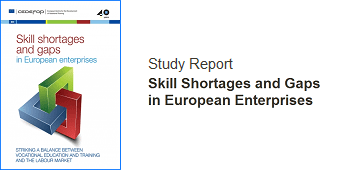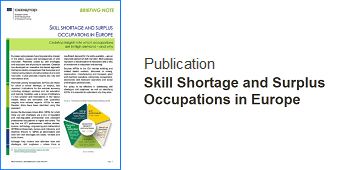The skills gap: Is Europe next in line?
In this article we explore the imminent skills gap across Europe. Read more about strategies and insights that address this challenge and navigate the evolving workforce landscape successfully.

Reading the first part of this blog, you’ll soon discover that the ‘skills gap’ can be a complex issue. America has been particularly hard hit by this phenomenon, which has led to numerous thought provoking articles.
It prompted leading strategic talent development consultant Edward Gordon to write several books on the subject in which he identifies a ‘skills mismatch’ within the labor market. Two of his books, Winning the Global Talent Showdown and Future Jobs: Solving the Employment and Skills Crisis, are particularly worthwhile reading for their holistic view of the problem and pragmatic approach to future solutions. In his books, the author calls on everyone concerned to take personal responsibility – employers and employees, politicians and parents, students and teachers. In short, they’re essentially how-to guides for improvement.
Is Europe next in line?
According to Gordon, it’s highly likely that Europe will be next in line. But we needn’t panic, because apparently we’re still ahead of our widening skills gap. Various studies and reports published by Cedefop (European Centre for the Development of Vocational Training) would seem to confirm this assertion. Two publications are particularly interesting. You can download the publications on the website of Cedefob, just click on them:
A salient detail emerging from these publications is that challenges vary from country to country and from sector to sector. The STEM, ICT, health care, and education sectors should be the most concerned.
The education sector has already had a wake up call and is working hard to reduce the size of this gap in the future. Jeremy Johnson, founder and CEO of Andela, has already written an article on this subject in which he discussed the development of coding schools. These innovative educational formulas are succeeding in closing the skills gap within the ICT sector. Codecademy is a prime example of such a school. Zach Sim’s blog is also worth a read. He’s one of Codecademy’s founders.
Massive open online courses (MOOCs) are booming. They’re competing with the traditional university business model and providing opportunities to a broad cross section of people to develop specific skills and competences.
But there’s much more. Take a look at New Tech Network, a non profit organization dedicated to designing and implementing innovative, new learning systems.
In its own words, “We work with districts and communities throughout the country to transform schools into innovative learning environments.”
New Tech Network focuses in particular on creating a better match between graduates and the private sector, especially within STEM industries.
Focusing on On The Job Learning
In Part 1 of this blog, I discussed Liz Ryan’s vision relating to ongoing on the job learning, which prompts me to share the viewpoints of both the 70:20:10 Institute (English) and Tulser (Dutch). Read Jos Arets’ article, author of 702010 naar 100% performance [‘702010 to 100% Performance’].
To summarize, place 70% of your focus on informal learning, 20% on social learning (also informal), and only 10% on formal learning.
What’s the moral of this story?
Eventually, even Europe will face a skills gap. But what’s the solution? On the one hand, I believe creating a better match between the education and private sectors using innovative, new learning solutions is the answer. On the other hand, I think companies need to focus more on informal and on the job learning, whereby recognition of informal aspects is key. Only once experience and competences are recognized – thereby adding to an employee’s CV or portfolio – will he or she be motivated to become the CEO of his or her own career. It will take some time before this becomes commonplace, but don’t forget…Rome wasn’t built in a day.
Now I’d like to hand over to you. Is the skills gap a big issue in your career? What do see as being the holy grail? How can you create a perfect match between employers and employees?
Author Copied
Revisions Copied



